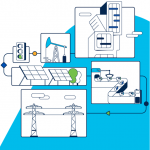Cisco’s market-leading networking products extend wireless capabilities to challenging industrial environments. That includes sites that are contaminated with dust or dirt, as well as those which are extremely hot or cold. These solutions also stand up to high levels of electromagnetic interference (EMI) and vibration. But there are some environments that are even harsher and require an additional level of protection.
That’s where Cisco’s collaboration with Extronics – the company I lead – comes into play.
At Extronics, we make specialty wireless enclosure solutions that are certified to international standards for explosion protection, including ATEX, IECEx, North American as well as other internal standards. Through our relationship with Cisco, we provide explosion protection that makes it possible to install Cisco’s standard products into the most potentially explosive atmospheres and the harshest of industrial environments, complementing Cisco’s Class I, Division 2 access point, the Catalyst IW6300 Heavy Duty access point.
When integrated into our wireless enclosures, Cisco industrial wireless devices can be deployed throughout offshore platforms, FPSO’s, oil refineries, chemical plants, pharmaceutical plants and any other industrial site that handles flammable or explosive substances. And because Extronics is part of the Cisco IoT Design-In Program, we’ve created and tested our enclosures specifically for use with Cisco’s industrial IoT wireless portfolio.
These complementary capabilities make it possible for industrial organizations to accelerate their journey to digitized operations. What follows are just a few examples of how organizations benefit when they can implement Cisco’s portfolio of wireless industrial networking solutions into the harshest, most hazardous environments:
- Mobile workforce. Together, we help give workers secure and reliable access to data whether they’re at a workstation in the office or in a remote part of a refinery or factory floor using intrinsically safe certified tablets and smart phones. This creates new efficiencies as workers can access all the systems they need – including calibration records, permits to work, order scheduling and more.
- Remote expert. Extremely hazardous environments often rely on a diverse collection of third-party equipment and systems. A company incurs significant time and expense to bring specialized technicians on site when these assets need maintenance, troubleshooting or repair. With a smart phone or headset camera running on a robust wireless network, an in-house technician can engage a specialized technician remotely with two way audio and high definition video – so both can see exactly what’s happening and implement a solution together. That means systems are back up and running more quickly and cost efficiently.
- Asset tracking. Secure and reliable wireless networking fuels other use cases for visualizing the location and status of critical assets that move throughout expansive industrial environments. With that visibility, finding assets as part of day-to-day operations takes minutes, not hours. Longer term, these insights help ensure higher utilization of resources while preventing unnecessary investments in additional equipment.
- Worker safety. By their very nature, hazardous environments are fraught with safety risks for the humans who operate them. Wearable tags connected to a Cisco network enhance safety by enabling workers to call for help when they’ve fallen, been hurt or otherwise need help. The system can show the worker’s location in real time. That helps facilitate a prompt and effective incident response and aiding fast and efficient mustering of personnel – a huge advantage when facility size can be measured in square miles!
Beyond these specific examples are a host of other applications that were previously out of reach for the most hazardous industrial sites. Together, Cisco and Extronics are helping oil and gas, chemical, pharmaceutical, mining and other industrial companies to safely implement wireless infrastructure – and unleash new levels of efficiency, productivity and safety.

CONNECT WITH US